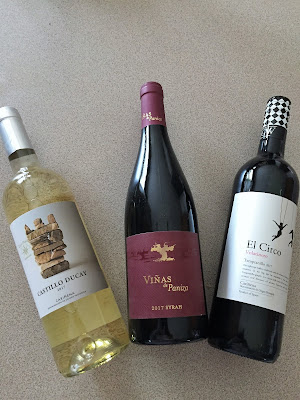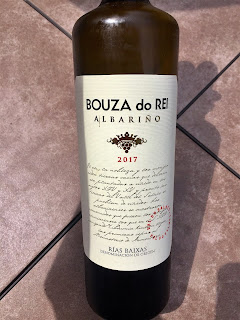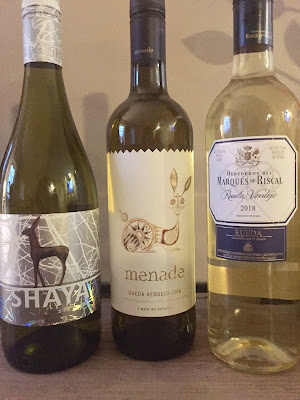I’ve
highlighted many different wine regions of Spain during my wine
journey. Always great value and a wide variety of wines for a wide
variety of tastes. Northern Spain has many great wine regions just
waiting to be explored and today we’re featuring the regions of Rias Baixas, Navarra and Carinena.
Tucked
up near the Pyrenees Mountains the Navarra wine region hosts varying
soils and climates with influences from both the Atlantic Ocean and the
Bay of Biscayne along with the mountains and the Bardenas Reales desert.
The Navarra wine region became a DO (Denominacion de Origen) in 1958. There are 5 subregions within the Navarra. Tierra Estella, Valdizarbe
and Baja Montana features an Atlantic climate that is both cool and
humid. Ribera Alta hosts a continental climate and Ribera Baja is more
Mediterranean. All playing a role in different styles of wines produced.
Some
quick facts to give you an overview of what is produced in the Navarra
wine region. It is 90% dominated by red grapes including both red and
rose wines leaving 10% to white wines. Seventy percent of the wines
are dedicated to native grapes with tempranillo and garnacha leading the pack.
The Wines of Navarra
2018 Bodegas Inurrieta Orchidea – I’ve
featured this wine in the past featuring the 2017 vintage and this was my pick of the two. This wine
is made from 100% sauvignon blanc. Pale yellow in the glass with
beautiful aromas of citrus and tropical fruits. Refreshing! The wine
spends 4 months over lees rounding out the wine. Just a great every day
wine at a super affordable price. ABV 13% SRP $12
2018 Bodegas Ochoa Calendar Tinto – Another
wine I’ve featured as well in the past with the 2015 vintage. The Ochoa Calendar line
features their young wines. I’m not one for fruit forward style wines,
but again, a great value and enjoyable every day wine for many. Made of
70% organic certified tempranillo grapes with 30% garnacha. Purplish tinge showing it’s youth this wine. Ripe and fruity red fruits (strawberry and raspberries) showing from the garnacha with some tannin behind the tempranillo. ABV 13.5% SRP $12
The Cariñena Wine Region
Cariñena is
the second oldest DO in Spain starting in 1932. Located in the
northeast of Spain near the Ebro Valley and close proximity to the
Pyrenees Mountains. Another region dominated by red grapes with garnacha making up more than half of the vineyard acreage.
Three of the largest wineries are cooperatives including Bodegas Paniza, Bodegas San Valero and Grandes Vinos. Of all the wines I’m sharing today these were my favorites and at unbeatable prices.
The Wines of Cariñena
2017 Bodegas San Valero Castillo Ducay Blanco – Bodegas San Velero
started back in 1944 with about 66 partners and today has over 500
growers on an amazing 8,700 acres. They have some of the oldest
vineyards in Cariñena with some over 100 years old. The Castillo Ducay is made of 80% macabeo
and 20% chardonnay. Pale straw color with a floral, aromatic nose of
stone fruit. Light to medium bodied, crisp with lively acidity, lemon
notes and salinity on the finish. I found this wine quite enjoyable.
SRP $9 ABV 13%
2017 Bodegas Paniza Syrah – Made of 100% syrah. Deeb ruby more rusty colored near the edges. Notes of black cherry and baking spices. Medium to full-bodied, smooth reminding me of cherry cola. ABV 14.5%
Bodegas San Valero Particular Chardonnay –
The “Particular” wines of Bodegas San Valero are only produced in the
best vintages and these plots of land were selected for producing their
best grapes. This wine spends about 6-8 hours of cold maceration where
the free run juice goes to a settling tank for 12 hours before it spends
3 months in French oak. SRP $7 ABV 12.5%
2018 Bodegas Paniza Fabula de Paniza Garnacha Rosé –
This coop was established back in 1953 and is comprised of about 400
growers on 6,200 acres of land. The vineyards are located on hilly
terrain near the Iberian Mountains. I typically don’t find myself
drinking rose year round,
but I have recently had some including this one that I quite enjoyed.
Made of 100% grenache. A pretty pale pink color showing brilliantly in
the glass. A tart, wild strawberry on the nose. Light and delicate on
the palette displaying strawberry with nice acidity. Clean and easy to
drink. SRP $9 ABV 13.5%
Granted DO status in 1988 under the EU. The other two regions have been primarily red, but here white is king and albarino is the star of the show making up about 90% of the plantings. Rias Baixas is in northwestern Spain in the Galicia region. It’s also known as “Green Spain” due to it’s abundant green landscape. Rias Baixas is made up of 5 sub-regions: Val do Salnes, Condado do Tea, O Rosal, Soutomaior and Ribeira do Ulla each with their own styles of albarino.
2017 Bodega Bouza do Rei Albarino Val do Salnes – Located in the Val do Salnes. This winery was one of the first of the Rias Baixas
DO established in 1984. A brilliant straw yellow in the glass with a
fragrant nose of tropical fruits and green apple. Dry and light bodied
with good acidity. Fresh showing grapefruit, apple and citrus. Clean
and refreshing. SRP $16 ABV 13%
 2018 Bodegas Eidosela Ethereo Albarino – Located in the Condado do Tea region this is a warmer region lending more tropicality to wines. Bodegas Eidosela was started in 2003 by a group of growers on over 100 acres. The name Eisoela comes from the combination of the district and parish (Eidos and Sela)
where their facilities are located. It is located near the largest
river in Galicia, the Mino river. This wine was straw colored with a
floral nose of peaches. On the palatte it’s clearn with a glycerin feel showing lime and melon. ABV 12.5% SRP $18
2018 Bodegas Eidosela Ethereo Albarino – Located in the Condado do Tea region this is a warmer region lending more tropicality to wines. Bodegas Eidosela was started in 2003 by a group of growers on over 100 acres. The name Eisoela comes from the combination of the district and parish (Eidos and Sela)
where their facilities are located. It is located near the largest
river in Galicia, the Mino river. This wine was straw colored with a
floral nose of peaches. On the palatte it’s clearn with a glycerin feel showing lime and melon. ABV 12.5% SRP $18
The Ribera & Rueda del Duero Wine Region
The Ribera and Rueda wine region is
located a couple hours north of Madrid. Located nearby the Duero River
within the Castilla e Leon region. The Rueda DO was established in
1980 and was the first in Spain to be solely focused on whites featuring
the verdejo grape, Spain’s most planted grape. It was quite interested
to learn the dirunal
shifts in temperatures here as much as 50 degrees a day. The grapes
are harvested at night to preserve the freshness and acidity.
Ribera, on the other hand, is primarily red featuring mostly the tempranillo grape, known locally as tinto fino.
This part of the region also faces extreme climate changes and hosts
many old vines with 1/3 of the vines aged over 50+ years old.
The Wines of Rueda
2016 Bodegas Shaya Verdejo – Located in the southeast part of the appellation and home to many old vines. This wine is made of 100% verdejo with 20 of the wine aged 4 months in French oak barrels. This wine shows aromas and notes of peach, apple with some tropical and citrus notes. SRP $13 ABV 13.5%
2016 Bodegas Menade Verdejo – Run by the 5th
generation siblings of the Sanz family. This is their only bottle
under the DO Rueda designation as they believe in following their own
path. I always appreciate a winery looking to experiment and produce
the types of wine they desire than those dictated by regulations. Straw
colored with some golden hues. The nose shows ripe pineapple and melon
along with some toasty notes. Zesty acidity with more tropical notes
on the palette. Fresh. SRP $18 ABV 13%
2018 Herederos del Marques de Riscal – My
favorite from Rueda in these samples, this producer is well known in
the Rioja region of Spain whom moved their white wine production to the
Rueda in the 1970’s. This wine was straw colored showing more
tropicality, pineapple and wet slate. Refreshing and clean with solid
acidity. Lemon and grapefruit citrus notes with good length. SRP $13
ABV 13%
*These wines were provided as samples, but wine selections and opinions are all my own.






No comments:
Post a Comment